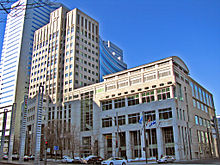|
Le français à bord des avions |
|
|
Date : |
24/09/2004 |
|
De Jean-Paul Perreault (Imperatif@imperatif-francais.org ) |
|
LE
FRANÇAIS À BORD
La diversité culturelle
mondiale.
Qu'en est-il pour les pays européens ou ailleurs dans le monde ?
Qu'attendent les gouvernements des pays non anglophones pour s'objecter à la main mise anglo-saxonne sur le contrôle planétaire lequel semblerait déjà s'exprimer au sein de l'OACI (et au sein des autres institutions internationales) ?
***************************
La nouvelle suivante (en anglais) extraite du site Internet unilingue anglais des "Canadian Owners and Pilots Association" ( http://www.copanational.org/ ) est reproduite intégralement à la fin de ce texte :
Nouvelles
exigences en matière de connaissance de langue :

Siège mondial de l'OACI à Montréal au Québec (Canada)
L'amendement 164 impose aux pays membres de l'Organisation de l'aviation civile internationale (OACI) (http://www.icao.int) dont le siège social est à Montréal, de nouvelles règles sur la langue d'usage dans le domaine de l'aviation.
En effet, d'ici le 5 mars 2008, les titulaires d'une licence canadienne de pilotage devront subir un examen de langue afin de s'assurer de leur compétence.
Les pilotes qui passeront l'examen en anglais pourront alors voler au Canada et au Québec. Par contre, les pilotes qui passeront ces examens en français seront limités à voler au Québec et dans la région d'Ottawa, étant donné que NavCan n'assure pas de service bilingue dans le reste du Canada.
Les pilotes anglophones auront donc le loisir de passer les tests dans leur langue maternelle et ainsi voler partout au Canada incluant le Québec.
Pour leur part, les pilotes francophones seront désavantagés puisque limités au Québec et la région d'Ottawa. à moins qu'ils fassent la preuve qu'ils maîtrisent l'anglais !
Se pourrait-il que l'OACI, à l'instar de plusieurs autres organisations internationales, soit contrôlée par l'anglosphère ?
Qu'attendent les gouvernements des pays non anglophones pour s'objecter à la main mise anglo-saxonne sur le contrôle planétaire lequel semblerait déjà s'exprimer au sein de l'OACI ?
Il y a aussi lieu de se demander si le gouvernement du Canada, membre de l'OACI, représente bien les intérêts de toute la population canadienne et défend bien, par le fait même, la diversité culturelle mondiale !
Jean-Paul Perreault,
Président d'Impératif français
***************************
Communiqué
de presse du Canadian Owners and Pilots Association (COPA):
http://www.copanational.org/non-members/HomePageStories/HomePageStory121.htm
"...The new language requirements are contained in ICAO Annex 1 (Licencing)
Amendment 164 that passed in March 2003.
Amendment 164 imposes new rules on nations that are part of ICAO, including Canada. Under the new rules all countries must have language testing in place and all licences endorsed for language proficiency by March 5, 2008.
Because pilots from other countries fly in Canada, particularly international airliners, Canada is required to ensure that every pilot who flies in Canada meets the standard, even if they never fly internationally. Because of this, to fly inside Canada a pilot will need a language proficiency endorsement on their pilot's licence for an ICAO Level 4 (Operational) in English to fly everywhere in Canada, except Quebec and the national Capital Area where a language proficiency endorsement on their pilot's licence for an ICAO Level 4 (Operational) in French or English will be acceptable.
Anyone who tests at a level below that of ICAO Level 6 (Expert) will have to undergo regular and formal testing. Proficiency at an ICAO Level 5 (Extended) will require formal retesting every six years. Proficiency at a Level 4 (Operational) will require formal retesting every three years. Any pilot who tests below ICAO Level 4 will be at a level below that required to qualify for ICAO-mandated licences, such as the Private Pilot Licence.
The measures are recommended, but not ICAO-mandated, for other pilot licences below the Private Pilot, such as Recreational, Glider, Balloon and Ultralight Permits.
COPA is aware that there are a number of potential other problems that will directly impact COPA members on this issue. In particular these include :
1. Even those COPA members who speak English or French at an "Expert" level will balk at having to pay for an evaluation to prove to TC that they speak English or French so their licence can be endorsed.
2. Many pilots in Canada for whom English is not their first language, and even some for whom English is their first language, will not qualify at the ICAO Level 6 (Expert) level in English. That standard is very high and many people who think that they speak and understand English well will not qualify at ICAO Level 6. This will mean that they will require formal (and expensive) testing and will have to be re-tested every three or six years, depending on level achieved.
3. Francophone pilots who do their testing in French will be formally limited to flying only in those areas where French is designated for use (The Province of Quebec and the National Capital Region).
4. Some Canadian pilots will be found to have language proficiency below Level 4 and may be therefore restricted to "NORDO flying only", or after March 5, 2008 grounded entirely until they are re-tested at Level Four or higher.
COPA considers this new standard to be a critical freedom of flight issue for our members. Since it is unclear at this time how it will be applied within our borders and for operations to other English-speaking countries, and considering that the costs could be very high and recurring for a significant number of our members, we are giving this a high priority with Transport Canada...."
*****************************
Adresses
utiles :
M. Serge Martel,
Association des gens de l'air du Québec
site : www.aero.ca/f_agaq.htm
courriel : AGAQ@globetrotter.qc.ca
Téléphone : 418-872-2157
OACI, Bureau des relations extérieures et de l'information du public
site : www.icao.int
courriel : icaohq@icao.int
Lectures suggérées :
Le français à bord (Archives de Radio-Canada)
http://archives.radio-canada.ca/IDC-0-17-973-5810/politique_economie/air_canada/clip5
Organisation de l'aviation civile internationale (Personnal Licencing)
http://www.icao.int/icao/en/trivia/peltrgFAQ.htm#q20